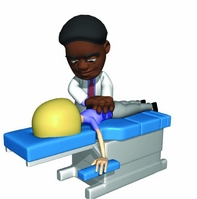DOCTOR'S ADVICE: Why do I have belly pains?
Published: Sunday | November 15, 2009

Q Doctor, I am a 31-year-old married woman, and I am very worried about something I heard a doctor say about me last week. I had been admitted to the hospital with belly pains, and fortunately everything settled down after they gave me some antibiotics. I am supposed to go back next month.
While I was in the hospital I overheard one of the gynaecologists say to someone else: 'We must make sure she doesn't get PID'. Or maybe he said 'We must make sure she doesn't have PID'.
What does this mean, Doctor? What is 'PID'?
I tried to look it up on the Internet, but it seemed like 'PID' was some kind of backache and has nothing to do with belly pain.
Is it serious? Is it some kind of cancer?
A No, it isn't cancer. But it is very common in women, and all women should be aware of it.
It has nothing to do with the back either. The reason for the mix-up when you checked the Internet is that the letters PID can stand for Prolapsed Intervertebral Disc - which is a common spine condition. But clearly, you do not have that.
In your case, PID stands for pelvic inflammatory disease. That is a woman's disorder in which many of the tissues which are located near the womb become inflamed. The result can be intense pain, and other problems such as a discharge, fever and the inability to have children.
This happens when germs get into the lower part of the woman's belly. They multiply thus causing all the problems associated with it.
In many cases, the germs got in while she was a teenager. But it she may not begin to get any symptoms until years later.
There are several possible ways the germs can get in:
As a result of an abortion
After a miscarriage
After childbirth (this is rare)
Occasionally, when a coil (an IUD) is inserted or removed
Very often, through sex.
In most cases, the germs of PIDs are those of sexually transmitted infections. The germs include things like the micro-organisms which cause chlamydia and gonorrhoea, though there are many others.
The big danger with women is that they may contract an STI and not realise it.
In most cases chlamydia and gonorrhoea produce no symptoms, yet it may be affecting her inside damaging tissues and often blocking the tubes. Months or years later, pain and infertility may occur.
So PID is a very serious and women should take steps to avoid it.
These include:
Avoid casual sex and promiscuity.
If you do have sex, insist that he wears a condom.
If you have had an unwise sexual encounter, always go to a doctor and get a check-up.
In your particular case I think your doctor was very alert, and he gave you a course of antibiotics, which I am sure will have been the right ones to treat PID, or to make sure that you did not get it.
This is very encouraging so I am sure you are going to be OK. But I urge you to keep your next appointment at the hospital. When you get there, ask the doctor about the risks of PID.
In the meantime, I think that it would be best if you do NOT have sex until you have gone back and seen the doctors at the hospital.
Q Doctor I find that certain women frighten me, and make me feel inadequate. On those occasions I cannot have an erection.
What can I do?
A The erection process is vulnerable to anxiety or fear. That is because these emotions produce hormones which are the 'enemies' of erection.
So my best advice is to see a good counsellor or psychotherapist and talk about your feelings of fear and inadequacy. These may well date back to childhood in some way.
You really need to get rid of these feelings if you are to establish an adult relationship with a woman and (perhaps), settle down, get married and have children.
Q Doctor, I am pregnant, and I am tempted to have an abortion. Should I do it?
A Well, all I can say is that I ask you not to have anything to do with any illegal abortion, which will probably introduce infection. It could even kill you.
Q I was unfaithful to my wife last Saturday night, but for only about five seconds.
Could I have caught something?
A Most certainly. Five seconds is long enough to get an infection. Admittedly, the longer the greater are the chances of catching some germs.
So please do NOT have sex with your wife until you have been thoroughly checked by a doctor.
Q I am 36 years old and my monthly cycle has suddenly stopped. The last one was eight weeks ago, and it was very heavy.
Could this be early menopause?
A It is possible, but unlikely at your age. I would advise you to get a pregnancy test done, and then see a doctor. It could be anaemia (weak blood) that has stopped your menstruation, especially if your fairly recent periods were heavy.
Want advice from Doc? Email questions and feedback to editor@gleanerjm.com.
